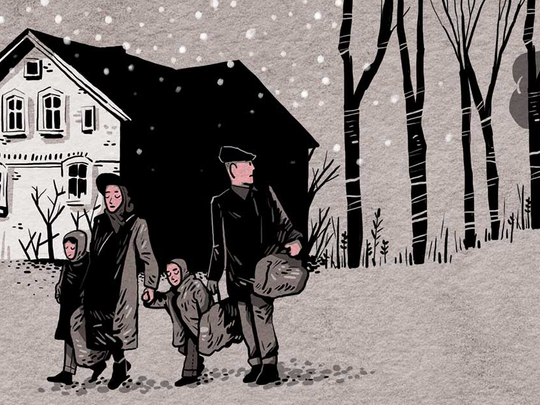
By Walter Kempowski, translated by Anthea Bell, New York Review Books, 343 pages, $16.95
In the first frigid months of 1945, nearly 750,000 Germans fled East Prussia ahead of the advancing Red Army. Lines of horse-drawn carts laden with women, children and painstakingly trussed-up possessions snaked along roads that were often clogged with tanks heading in the opposite direction. Three hundred thousand civilians died of cold or in Allied bombardments or drowned in overloaded boats trying to cross the Baltic Sea.
With its harrowing stories and epic sweep, this exodus would seem a rich mine for novelists. Yet for half a century it lay untapped. During that time, the subject of the German civilian victims of the Second World War and the millions of internal refugees created by flight and expulsion was monopolised by the right-wing fringe of West German politics, stoking dreams of reclaimed territories and propping up false equivalences with the immense suffering wrought on others by Hitler’s war. In East Germany, the topic was simply taboo.
When Walter Kempowski’s All for Nothing appeared in German in 2006, it was part of a first wave of public engagement with a long-simmering trauma. This novel, now published in a crystalline translation by Anthea Bell, examines with melancholic detachment the members of a still-privileged household in a small East Prussian town as they wrestle with a crucial decision: whether to stay or go. When they do join the swelling convoys that pass by their windows, they are sucked into the chaotic death spasms of the war.
Kempowski, who endowed his characters with autobiographical traits, died in 2007 at the age of 78. Five years earlier, Gunter Grass had published Crabwalk, a fictionalised account of the 1945 sinking of a ship bearing thousands of East Prussian refugees. In 2007, The March of Millions, a lavish television production, sparked debate over the culture of remembrance, as well as protests from Polish politicians irritated by the portrayal of wartime Germans as victims.
As the stories kept coming, their significance changed. In 2015, as hundreds of thousands of mostly Syrian refugees spilled into Germany, the country’s runaway literary hit was Dorte Hansen’s This House Is Mine, a weightlessly lyrical novel about the legacy of the East German trauma. Across the media, commentators now held up the historical German exodus not as a right-wing grudge but as a rallying flag for liberal empathy with contemporary migrants and refugees. But All for Nothing isn’t easily appropriated by any ideology. Kempowski’s sympathy for the suffering of his characters and his acknowledgment of the attendant destruction of their civilisation are diffused by a fine-grained ambivalence.
At the heart of the story, which is set in January 1945, is a family of once-landed gentry that in the interwar years traded most of its estate for stocks in English and Romanian industries. Despite the clan’s attendant losses, the exasperatingly vague Katharina von Globig, “famous as a languorous beauty,” is still able to spend her days lounging behind closed doors. Her husband, Eberhard, has been granted a cushy position as an officer in Italy, far from the front and close to small luxuries. In a hidden nook of the Georgenhof, the family manor, bottles of Barolo lie waiting to be uncorked “when the war is over.”
The house is run by an energetic “Auntie” and three foreign workers, from Poland and the Ukraine, who listen expectantly to the low rumbling of no-longer-distant artillery. A pallid son, Peter, spends his days trying to find something interesting to look at through the microscope he received as a Christmas present. His education is entrusted to an ageing village schoolmaster, Dr Wagner, who gladly makes the daily eight-km round-trip journey on foot through the bitter cold for the prospect of fried bread and crackling and, perhaps, other, more private satisfactions.
Visitors come to the house: a female violinist who plays for injured soldiers in field hospitals; a philatelic economist; a painter charged with sketching what remains of the local landmarks. The talk of war and invasion proceeds in platitudes and snippets of propaganda; here and there, German atrocities perpetuated farther east are spoken of in hushed tones. The local Nazi Party leader, who has orders to stave off any attempt at flight to the West, is not invited inside but takes frequent shortcuts through the Georgenhof grounds, leaving a trail in the pure snow.
Caught between denial and fear, the residents appear suspended in time. It’s boredom, not pity, that drives Katharina to shelter a Jewish fugitive for a night, a decision that will finally, catastrophically, set the family’s exodus in motion.
Kempowski’s prose contains collages of confetti-size fragments from literature, biblical texts, church chorales, 1940s movies and popular songs. It’s a technique he employed to illuminating effect in his nearly 8,000-page Echolot, a nonfiction work made up of collected texts offering myriad perspectives on key weeks of the war.
The idea for this technique came to Kempowski one winter evening in 1950 when he was a prisoner in the German Democratic Republic, accused of spying for the Americans. Crossing the courtyard of the prison, he heard a humming sound. “Those are your comrades in their cells,” a guard escorting him said, “talking among themselves.” Kempowski later described the hum as a “Babylonian chorus.”
In All for Nothing, that chorus is shrunk to a chamber motet that is finely blended yet only bitterly poignant, making the novel’s bloodied and epic finale feel insufficiently supported. The assembly of found texts is apt for establishing the period setting and marking the disintegration of German culture, not for the creation of characters with much depth. Still, as a literary response to a long-buried collective trauma, All for Nothing is well worth reading, especially now that the country’s parliament contains delegates from the far-right Alternative for Germany party with deep ties to groups who were expelled from East Prussia.
– New York Times News Service









